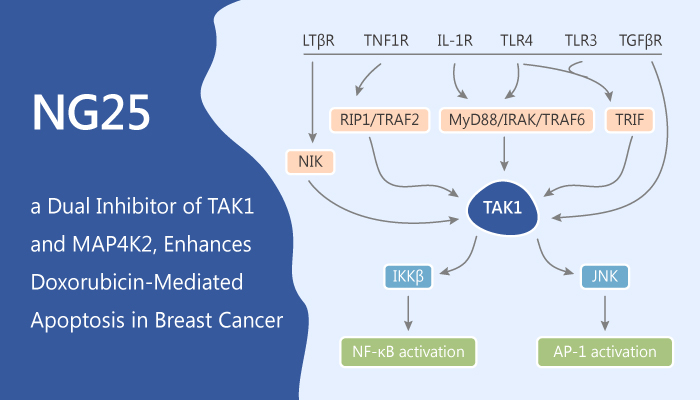In previous blog, we described NG25 as a potent dual TAK1 and MAP4K2 inhibitor. The compound shows excellent inhibition for inhibiting IKKβ activation by TLR7 and TLR9 agonists.

Today, I’d like to introduce the anti-tumor activity of NG25 in breast cancer. A study from Zhenyu Wang carried out a series experiments both in vitro and in vivo.
In vitro, the authors assessed the inhibitory effect of NG25 on the proliferation of breast cancer cells, including T-47D, MCF7, HCC1954, MDA-MB-231, and BT-549. As a result, NG25 suppressed the viability and proliferation of breast cancer cells.
Subsequently, the authors evaluated the effect of NG25 on the cytotoxic effect of Dox. The cell viabilities were lower when the cells were treated with the combination compared to that with Dox single agent treatment. The result indicateed that NG25 may sensitize the breast cancer cells to Dox-mediated cytotoxicity. Furthermore, NG25 enhanced the inhibitory effects of Dox on anchorage-independent growth of breast cancer cells.
Additionally, TAK1 is required for genotoxic stress-induced NF-κB and p38 activation. To clarify this concept in breast cancer cells, the authors evaluated the effects of TAK1 inhibition with Dox mediated NF-κB activation in breast cancer cells. As shown in the study, TAK1 inhibition by NG25 blocked Dox-induced p38 phosphorylation and Dox-induced IκBα degradation. To sum up, TAK1 plays an indispensible for Dox induced NF-κB and p38 activation in breast cancer cells. And NG25 can block Dox induced NF-κB and p38 activation in breast cancer cells.